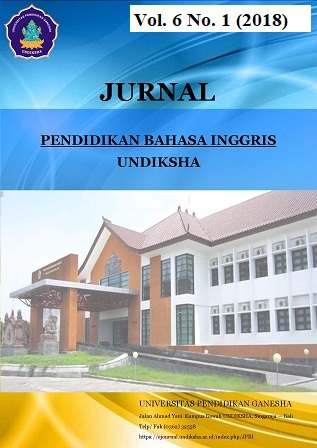THE EFFECT OF SCRIPTED SONGS TECHNIQUE ON STUDENTS’ ENGLISH COMPETENCE (An Experimental Study of Fourth Grade Students of SD Negeri No 6 Dalung, Kuta Utara Sub-District, Badung in Academic Year 2013/2014)
DOI:
https://doi.org/10.23887/jpbi.v6i1.20421Abstract
This experimental study aimed at finding out the significant effect of Scripted Songs technique and conventional teaching technique towards English competences of fourth grade students of SD Negeri No 6 Dalung, Kuta Utara Sub-District, Badung in academic year 2013/2014. The design of this study was post-test only control group design. The implementation of cluster random sampling technique showed that class 4.A as the control group which was taught by using conventional teaching technique and class 4.C as the experimental group which was taught by using Scripted Songs technique. Both groups consisted of 40 students each. The results of data analysis showed that the students who were taught by implementing Scripted Songs technique performed better than those who were taught by implementing conventional teaching technique. The mean score of experimental group was 79.1 and the control group was 75.5. The results of t-test analysis showed that the tobs was 3.755. It was higher than the value of the tcv at 1.99085 (α = 0.05). Moreover, the result of questionnaire indicated that the implementation of Scripted Songs technique motivated the students in comprehending English competences. In conclusion, Scripted Songs technique contributed in giving highly significant effect to students’ English competences.
Keywords: Scripted songs, English competences
References
Brewer, C. 2008. Soundtracks for Learning: Using Music in the Classroom. Retrieved on January 10th, 2014. Available at http://www.amazon.com/gp/product/096558254X/ref=as_li_tf_tl?ie=UTF8&tag=literacyvolun-20&linkCode=as2&camp=217153&creative=399353&creativeASIN=096558254X#reader_096558254X
Broughton G., Christopher B., Roger F., Peter H., Anita P. 1980. Teaching English as a Foreign Language. 2nd ed. London: Routledge. Retrieved on January 10th, 2014. Available at http://efyou.persiangig.com/.sjHn5tgvMC/teaching/Teaching%20English%20as%20a%20Foreign%20Language%20(Routledge%20Education%20Books).pdf
Cross, D. 1991. A Practical Handbook of Language Teaching. Great Britain: Dotesios Limited.
Ersöz, A. 2007. Teaching English to young learners. Ankara: EDM Publishing.
Gobbi, D. A. 2001. Música enquanto estratégia de aprendizagem no ensino de Língua Inglesa. Universidade de Caxias do Sul e Universidade. Retrieved on January 10th, 2014. Available at http://www.lume.ufrgs.br/bitstream/handle/10183/3066/000331440.pdf.
Harmer, J. 2007. The Practice of English Language Teaching. Longman. Retrieved on January 10th, 2014. Available at http://atiyepestel.files.wordpress.com/2013/05/jeremy-harmer-the-practice-of-english-language-teaching.pdf
Horn,C. A. 2007. ''English Second Language Learners: Using Music to Enhance the Listening Abilities of Grade ones.'' Unpublished thesis, University of South Africa. Retrieved on January 10th, 2014. Available at http://etd.unisa.ac.za.ETDdb/theses/availble/etd09212001331/unrestricted/disertation.pdf
Murphey, T. 1992. The discourse of pop songs. TESOL Quarterly, 26(4), 770-774. Retrieved on January 10th, 2014. Available at http://dx.doi.org/10.2307/3586887.
Pereira F. E., Isabella A. O., Mariana S. S. 2012. MUSIC IN THE ENGLISH LANGUAGE CLASSROOM: going beyond the lyrics. Retrieved on January 10th, 2014. Available at http://periodicos.unifacef.com.br/index.php/rel/article/download/401/401
Ratminingsih, N. M., Suwatra, I. I. W., Rasana, I. D. P. R. 2013. Pengembangan Model Pembelajaran Bahasa Inggris Induktif Berbasis Lagu Kreasi (Scripted Songs): Inovasi Pembelajaran Integratif dan Holistik dengan Insersi Nilai Budaya dan Karakter Bangsa. Singaraja: Ganesha University of Education
Ratnasari, H. 2007. Songs to Improve the Students' Achievement. Semarang: Semarang State Univeristy.
Richards, J. C., and T. S. Rodgers. 2001 .Approaches and Methods in Language Teaching. Cambridge: Cambridge University Press.
Şahin. D. 2008. Teaching conditionals through songs in EFL preparatory classrooms. Yüksek Lisans Tezi, Selçuk Üniversity
Salcedo, C. S. 2010. The Effects Of Songs In The Foreign Language Classroom On Text Recall, Delayed Text Recall And Involuntary Mental Rehearsal. Journal of College Teaching & Learning. Retrieved on January 10th, 2014. Available at http://etd.lsu.edu/docs/available/etd1111102204823/unrestricted/Salcedo_dis.pdf
Setia R., Rozlan A. R., Gopala K. S. N., Norhayati H., Elangkeeran S., Razita M., Shahidatul M. M. S., Nurul I. M. Y., Razifa M. R., Nur A. A. J., Rozita M. K., Norhafiza A. S. 2012. English Songs as Means of Aiding Students’ Proficiency Development. Malaysia. Asian Social Science Journal. Retrieved on January 10th, 2014. Available at http://ccsenet.org/journal/index.php/ass/article/download/17633/11818
Şevik. M. 2012. Teaching Listening Skills to Young Learners through “Listen and Do” Songs. Retrieved on January 10th, 2014. Available at http://americanenglish.state.gov/files/ae/resource_files/50_3_3_sevik.pdf
Suryani, U. 2013. The Effectiveness of Using Song to Increase Students’ Listening Skill of the Second Year Students of SMK N 1 Ambal Kebumen in the Academic Year 2012/2013. Muhammadiyah University Of Purworejo
Ward, S. 1991. Using songs at the chalk face: practical techniques in language teaching. Walton-on-Thames: Thomas Nelson and sons Ltda.
Zahro, M. 2010. The Use of Song Lyrics to Improve Students’ Vocabulary of Verb. Walisongo State Institute for Islamic Studies Semarang. Retrieved on January 10th, 2014. Available at http://library.walisongo.ac.id/digilib/files/disk1/122/jtptiain-gdl-masningzah-6074-1-skripsi-p.pdf
Downloads
Published
Issue
Section
License
Authors who publish with the Jurnal Pendidikan Bahasa Inggris Undiksha agree to the following terms:- Authors retain copyright and grant the journal the right of first publication with the work simultaneously licensed under a Creative Commons Attribution License (CC BY-SA 4.0) that allows others to share the work with an acknowledgment of the work's authorship and initial publication in this journal
- Authors are able to enter into separate, additional contractual arrangements for the non-exclusive distribution of the journal's published version of the work (e.g., post it to an institutional repository or publish it in a book), with an acknowledgment of its initial publication in this journal.
- Authors are permitted and encouraged to post their work online (e.g., in institutional repositories or on their website) prior to and during the submission process, as it can lead to productive exchanges, as well as earlier and greater citation of published work. (See The Effect of Open Access)













